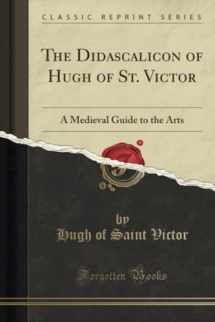
The Didascalicon of Hugh of St. Victor (Classic Reprint): A Medieval Guide to the Arts
Book details
Summary
Description
Excerpt from The Didascalicon of Hugh of St. VictorThe very title of the work places it squarely in a long ante cedent tradition of didascalic, or didactic, literature concerned in various ways with what arts or disciplines a man should study and why he should acquire them. In the Latin Christian West, such literature begins with Augustine and continues through Boethius, Cassiodorus, Isidore of Seville, Bede, Alcuin, Rhabanus Maurus, and the late Carolingian masters, including John the Scot. Before them, it is found in the writings of Cicero and Quintilian on the education of the orator; in the lost works of M. Terentius Varro on the arts; in the introductions to specialized treatises on particular arts, like that of Vitruvius on architecture or that of Galen on medicine; in certain moral epistles of Seneca; and in the allegory on the arts by Martianus Capella, Augustine's contemporary. Its roots reach far back to the ancient Greek conception Of an 'eyx6xxtog natseioc to the Objections of Socrates to Sophist education in the fifth century B. C. And to the opposed views Of education propounded in the next generation by Isocrates on the one hand and by Plato and Aristotle on the other.3 In a sense, the Dia'asea/ioon can be regarded as both a summary and an extension of this tradition.


We would LOVE it if you could help us and other readers by reviewing the book
Book review



